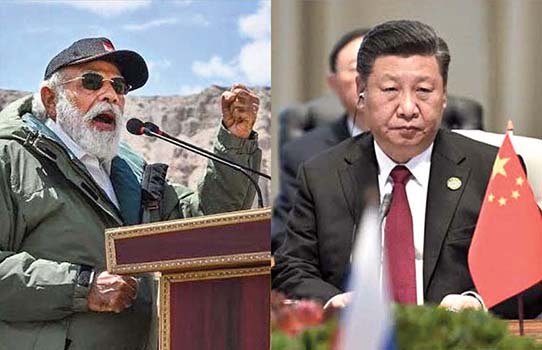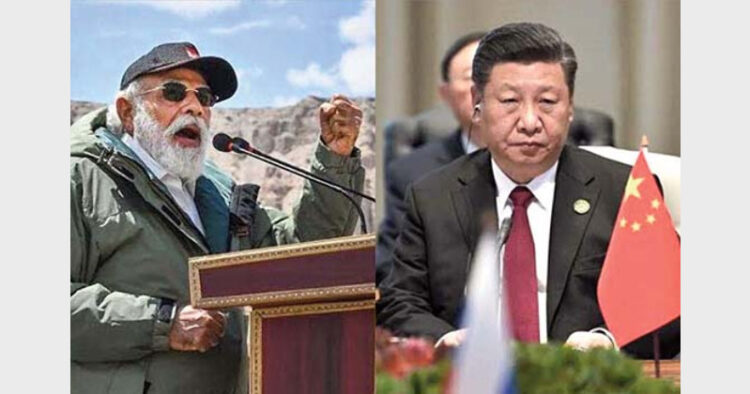Wars are based on three pillars and there should be a harmonious balance amongst the three pillars for success in war. These three pillars are the military, the government and the people.” — Acharya Chanakya in his Arthashastra

In another surprising move, Narendra Modi chose to visit Nimu, the military base in Leh and gave a strong strategic, political and civilisational message. The contrast he presented in the leadership style in comparison to his counterpart in China, Xi Jinping is worth analysing. Though strong personality and commitment to the cause are common points always referred about the two when it comes to the substance in words and actions, they present a stark contrast.
Leading from the front Prime Minister Modi responded to the occasion. The entire country is proud of the soldiers, and their valour and political leadership stand by the military action on the ground are unequivocally communicated points. When he mentioned about the borders and the composition of Bharatiya armed forces, the message of unity and integrity of the country is reiterated. The nation is above the party was also a subtle message at the political level. While articulating the point on defence preparedness, he mentioned that no one would respect our commitment to peace without power. Without naming China, he spoke about ‘the era of expansionism is over’. And he clearly outlined the paradigm for engaging with the world – we want peace but not at the cost of sovereignty. Even in the war against Corona, Modi showed a similar conviction towards participatory governance and sensitivity to the citizens stranded abroad.
Now contrast this with the all ambitious and powerful but insecure Chinese President Xi Jinping. His failure to control pandemic exposed his administrative acumen and whoever questioned the same had to face the heavy hand of the police machinery, the extension of the Communist Party of China (CPC). In the Galwan valley clash, at least forty-three Chinese soldiers got killed, and many more were injured. Xi did not even recognise their sacrifice. Naturally, there are dissenting voices within the Chinese Army (PLA). Military adventurism or financial muscle-flexing is the only means of communication for Xi Jiping when China is facing global isolation. Beijing is facing the second wave of Corona Pandemic, but Xi Jinping and his politburo members are reportedly missing from the capital. Many provinces in China are under floods, but people there are not getting any help or consolation. ‘Even Chinese people do not matter’ – is the all-over message you get from Xi Jinping.
Modi and Xi are indeed committed to their respective political parties representing contrasting world views. Modi represents the people of Bharat, while Xi is the leader of the party with the fascist ideology of communism. Modi and his party stand for civilisational values of Bharat and Xi’s CPC always believed in discarding everything that is ‘old’. The spiritual edifice provides different strength to the leader like Modi, and inherent materialist orientation becomes the most significant weakness for leaders like Xi.
Acharya Chanakya in his Arthashastra identified Government, Military and the People as the three pillars for success in war. Modi has all three. Xi Jinping has Government run by a party; he can perhaps manage military also with the party clout but people? Only CPC and Xi Jinping know as the people of China are not allowed to express their opinion in the name of People’s Democracy.
@PrafullaKetkar














Comments